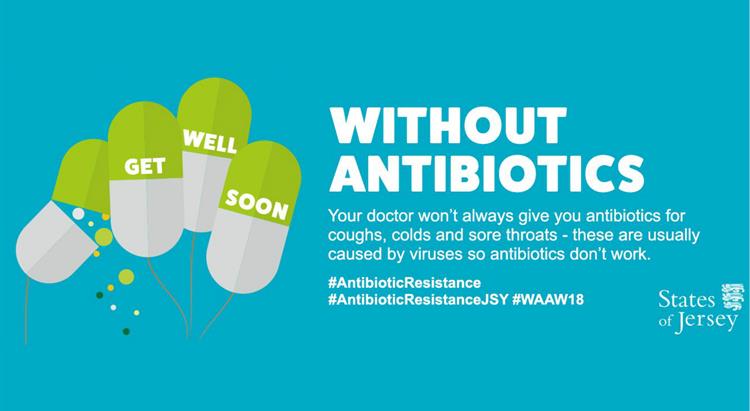13 November 2018

Patients experiencing a cough this winter are being encouraged to try simple remedies or over-the-counter medicines first, rather than expecting antibiotics from their GP.
Islanders are advised to take honey or cough medicines, and speak to their GP if their cough persists for longer than three weeks.
The advice coincides with European Antibiotic Awareness Day (Sunday 18 November) and the World Health Organization’s Antibiotic Awareness Week (12 -18 November). While antibiotics are important in treating serious infections caused by bacteria, their continued use is threatened by unnecessary use. The more antibiotics we use, the faster bacteria develop resistance.
Draft guidance has been issued to doctors by the National Institute for Health and Care Excellence (NICE). It aims to reduce the use of antibiotics for minor viral illnesses that are likely to clear up on their own.
In most cases, coughs are caused by a cold, other respiratory viruses, or bronchitis, and last around three weeks. Antibiotics only work against infections caused by bacteria; they don’t work on viruses. Using antibiotics when we don’t need to helps fuel antibiotic resistance and could prevent antibiotics from working in the future when we really need them.
Health and Community Services wants to raise awareness of minor illnesses which, given time, are likely to clear up on their own.
Dr Ivan Muscat, Director of Infection Prevention and Control at Health and Community Services, said: “If someone has a runny nose, sore throat and cough, we would expect the cough to settle over 2 to 3 weeks and for the majority of people, antibiotics are not needed.
“We’re encouraging people to ask their pharmacist for advice or check their symptoms on the NHS choices website. There is some evidence that honey and cough medicines relieve cough symptoms, but honey should not be given to infants under 12 months.
“If the cough is getting worse rather than better, or the person feels very unwell or breathless, then they would need to contact their GP. This is also the case if a cough persists for longer than three weeks.”
Dr Muscat added: “It’s important that islanders know doctors will prescribe antibiotics only when absolutely necessary, for a bacterial infection or for someone who is at particular risk of further complications. Antibiotic resistance is a global problem and the signs tell us this is set to get worse. Resistant organisms are now increasingly common in Jersey, affecting both the community and the hospital.”
In the past three years, the number of prescriptions issued for an antibiotic in Jersey has fallen by 10%. This means that on average, less than one (0.8) antibiotic prescription is dispensed per person per year.
The use of ‘broad spectrum’ antibiotics has also fallen in Jersey by a third in the past three years. This is important because local and international guidelines for the appropriate use of antibiotics discourages the use of so-called ‘broad spectrum’ antibiotics that are more likely to cause the development of resistance.
Evidence-based national guidelines encourage the use of short courses of antibiotics for the treatment of simple urinary tract infections. The average duration of treatment in Jersey has fallen from nearly 7 days to just over 5 days.
Paul McManus, Prescribing Advisor, said: “Specialist Pharmacists have been working with hospital colleagues and GPs to reduce unnecessary antibiotic use. Local antibiotic prescribing rates have fallen so we’re heading in the right direction, but they are still higher than in England. Evidence shows that England’s reduced use of antibiotics has not adversely affected patients. This means it’s safe to reduce our local antibiotic prescribing rates further.”
Dr Linda Diggle, Head of Preventive Programmes, who is working with the specialist team, said: “This year, we‘ve put a lot of effort into the flu vaccination campaign for those in at-risk or vulnerable groups, as we know vaccination helps reduce the use of antibiotics. Getting vaccinated against an infection prevents the infection from occurring, which in turn prevents the individual getting complications such as bacterial infections. If there are fewer infections , then doctors won’t be prescribing so many antibiotics."
Paul McManus added: “We’ve been encouraging GPs to use deferred prescriptions – that is, your GP may give you a prescription that can only be used some days ahead. This gives time for you to get better on your own without taking antibiotics, but if, after a certain number of days there is no improvement, you can still pick up the prescription for antibiotics without having to revisit your doctor. Or your GP may leave an antibiotic prescription with the surgery receptionist – so if, after a set number of days, your symptoms haven’t improved, you can collect the prescription from the surgery reception.
"The message from Health and Community Services is, if you take antibiotics when you don’t need them, this puts you and your family at risk of developing infections which cannot be easily treated. So we need your help – firstly, if you experience a cough over the winter, consider over-the-counter remedies to relieve the symptoms. Secondly, expect your GP to provide advice, rather than prescribe antibiotics. Evidence tells us that most commonly occurring respiratory infections clear up on their own. It’s better for you in the long term if you save antibiotics for when you really need them."